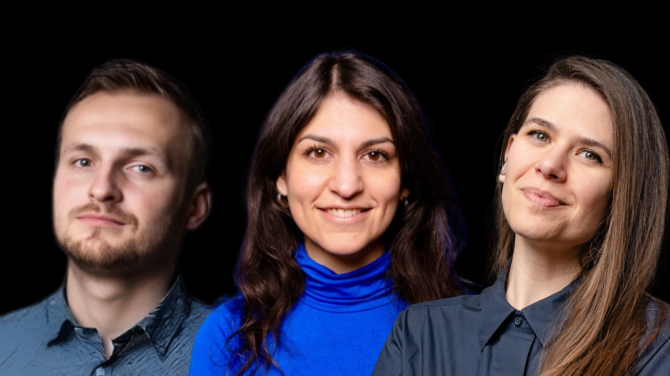Only have 1 minute? Here are 3 takeaways from the piece:
- CEE is emerging as a hub for deep tech innovation, driven by local talent, research infrastructure, outsourcing giants, and a mix of private and public funds.
- Looking at investors’ portfolios and agendas, we note an interest in healthcare, financial services, and cybersecurity, and technologies such as AI & ML, big data, data science, and analytics, and robotics, among others.
- Investors’ value-add doesn’t come only from funding, but from assisting startups with a mix of mentorship, networking opportunities, recruiting support, and the tackling of specific challenges for the sector, such as transitioning from research to entrepreneurship.
Central and Eastern Europe (CEE) is rapidly establishing itself as an EMEA hub for deep tech innovation. The region has experienced a remarkable surge in cross-sector venture capital funding, growing 7.6 times between 2017 and Q3 2022, up to €84.9 billion by Q3 2022.
In particular, boasting over 1300 deep tech startups according to Dealroom data, CEE stands as a fertile ground for tangible engineering and scientific breakthroughs that aim to address society’s most pressing challenges. Success stories like UiPath, Grammarly, Reface, ICEYE, or Dronamics exemplify the region’s untapped potential in driving breakthroughs. Poland further stands out, ranking 6th across Europe by percentage of VC funding devoted to deep tech and in 14th place in absolute figures, with $452.2 million.
By showing an increased preference for deep tech, CEE is following the European trend. Over $18 billion went to European deep tech startups in 2022 alone, solidifying the continent’s position as a hotspot for technological advancement. In fact, European LPs consider deep tech to be the second most promising segment, behind only planet positive solutions.
CEE’s transformation into a deep tech powerhouse has been fueled by its rich academic and research infrastructure, a mix of public and private money, and a steadfast commitment to fostering complex technological advancements.
Venture capital firms have recognized the region’s potential, leading to the establishment of new funds specifically dedicated to deep tech in CEE, further stimulating growth and innovation.
“Deep tech startups are essential to creating the next technological advancements that will solve some of the big challenges of humanity in the near future. It’s not about whether we want to – we absolutely must focus time, effort, and funding towards deep tech. It’s about how to imagine and build the future faster, better, with more impact,” says Desislava Gospodinova, Co-founder & Managing partner at AlfaStar Ventures, an early-stage alternative investment fund manager based in Bulgaria, operating AlfaStar Capital – an evergreen EuVECA fund.
Nityen Lal, Managing Director at Icos Capital, a collaborative venture fund that invests from a corporate-funded pool and is based in Poland and The Netherlands, further shared his excitement with The Recursive: “The region has long been a leader in scientific research, and we’re at the tipping point of transforming that into disruptive deep tech start-ups and scale-ups.”
The European Investment Fund (EIF), the largest investor in the European deep tech sector, has also played a pivotal role in nurturing the deep tech venture capital ecosystem in CEE, ensuring continued growth within the sector.
In addition to venture capital, the sector has also been driven by “local outsourcing giants stepping up their game considerably — many now operate their deep tech divisions, focusing on breakthrough fields, such as quantum computing, neural networks, and other fields. Success stories like Reface and Grammarly, both pioneering large-scale AI applications in their niches, proves that there is plenty of untapped potential,” says Dmytro Vartanian, General Managing Partner at SID Venture Partners, an Ukrainian venture capital firm focused on investments into early-stage, high tech technology startups building global solutions.
He goes on to highlight that the recent financing of the deep tech sector in Ukraine by the European Commission (€20 million, ed.note) is a sign that European leaders recognize potential in this emerging market: “it may seem like a small push, but we are quite sure that it may open doors to a much higher level of interest in the ecosystem,”
Investors see the region’s deep tech potential bolstered by its highly skilled STEM workforce and a network of research-oriented universities and academies. CEE boasts a plethora of educated and highly-driven talents, particularly in software engineering and data science.
How to get on deep tech investors’ radar
According to an European analysis, investors recognize the vast potential of deep tech and are focusing on sectors like hardware, AI, blockchain, AR/VR, and quantum computing software, aiming to address various societal and environmental issues. Notably, hardware-based deep tech has garnered three times more funding than hardware solutions across other tech segments since 2016. Europe demonstrates strength in quantum computing, health, and climate tech applications, while the AI, semiconductors, and defense sectors are areas where the region’s investments have room to grow.
In CEE, the largest percentage of venture capital funding in 2022 went to transportation, fintech, enterprise software, food, and security, with web3 – cryptocurrency and blockchain, in particular, as emerging trends.
Further looking at the portfolios of deep tech investors in CEE, we note the largest number of transactions occurring in the healthcare, financial services, and cybersecurity verticals, followed by food tech, climate tech, energy, space tech, and quantum computing. Meanwhile, investors show a preference for technologies such as AI & ML, big data, data science, and analytics, and robotics, followed by IoT and blockchain.
“CEE always surprises for the quality of the engineering teams originating from the region. While the markets are not deep enough to allow investors to focus on specific sectors, we always encounter very surprising approaches to solving difficult technical problems in very diverse areas. From computer vision and robotics (Photoneo) to new compute architectures and solutions (Anari, Codasip), to in-memory processing (Hazelcast), high performance applications (Ubercloud), databases and edge AI computing, all are areas where we found extraordinary teams developing world class solutions,” says Dan Lupu, Partner at Earlybird Venture Capital.
“With teams in The Netherlands and Poland, we keep an eye across Europe and have seen the ecosystem in Bulgaria pick up in recent years too. We’re excited to see even more startups come forward that are addressing urgent challenges and can decarbonise industry,” add Icos Capital’s Nityen Lal.
To catch emerging stars, investors are getting behind startup programs such as Deep Tech Trial in Ukraine (backed by SID Venture Partners) or Techcelerator in Romania (backed by GapMinder VC).
What support you will get from deep tech investors
Venture capital plays a crucial role in fostering innovation, supporting startups, and addressing the world’s most pressing issues. Yet support goes well beyond funding.
AlfaStar Ventures, for instance, wants to bring to the table a global-first focus, business experience, and an ecosystem of experts and entrepreneurs. They aim to provide strategic guidance, mentorship, and partnerships beyond the region.
In the deep tech sector, partnerships are maybe more important than everywhere else in the tech ecosystem. They can take many forms: public-private investors, corporate-startup, university-researchers.
“Public-private partnerships with focused government structures can have a great impact on the success of deep-tech startups. There’s a big role for public funds and how they can support these projects at the early stages of R&D, while we focus on the next steps of taking these projects to productizing and commercializing the underlying technologies,” shares Desislava Gospodinova, Co-founder & Managing partner at AlfaStar Ventures.
Meanwhile, Nityen Lal, Managing Director at Icos Capital, highlights their collaborative venturing approach, leveraging partnerships with corporations to help climate tech innovations scale and succeed. Such investors also facilitate the transition from researchers to entrepreneurs, offering functional support and networking opportunities to drive the startups’ growth.
Uni.Fund, a venture capital firm which supports university spinouts and other startups, further shares their multi-step approach of working with early-stage deep tech startups. This starts with ensuring alignment between universities, research labs, and researchers, and continues with mentorship as founders transition from researchers to entrepreneurs, support with commercialization and business development, recruiting, and tapping into an extensive network across CEE, Europe, North America, and LATAM.
“We also guide our founders toward successful exits, whether through acquisitions, mergers, or IPOs. We leverage our experience and network to identify potential buyers or navigate the process of going public,” says Sotiris Papantonopoulos, Partner at Uni.Fund.
More experienced investors have developed teams dedicated to helping founders with specific functions: “Recognizing that recruitment is the most critical area for a growing team, we developed an internal team that works alongside our investees to identify the best talent for each growth stage,” says Dan Lupu from Earlybird.








